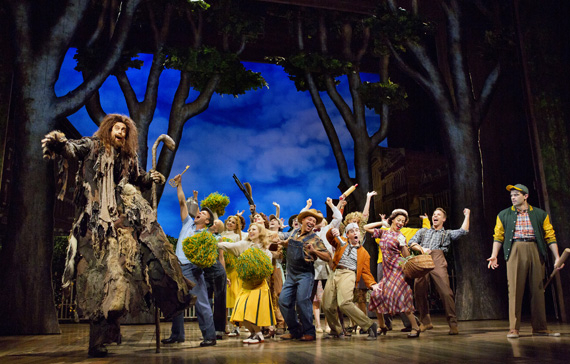Big Fish
An emotionally complex story, grounded acting, and insane stage wizardry add up to an enjoyable musical adaptation of the 2003 film.

(© Paul Kolnik)
When you’re a kid, Dad is a superhero, capable of amazing feats of strength in larger-than-life situations. At least that is true in the best of worlds. Of course, you could be a precocious little know-it-all, in which case Dad is just going to have to try extra hard. Based on the 2003 Tim Burton film (which was based on Daniel Wallace’s eponymous novel), John August and Andrew Lippa’s Big Fish is making its Broadway debut at the Neil Simon Theatre after an initial run in Chicago. At its core Big Fish is about a dad trying his best and a son who wants to believe in him but has doubts. By no means groundbreaking, Big Fish is a thoroughly entertaining musical, overflowing with heart and delivered with dazzling showmanship.
Edward Bloom (Norbert Leo Butz) is a southern traveling salesman with a penchant for tall tales: The witch who prophesied his death, the giant he befriended in Alabama, the assassin he thwarted during the war. His son, Will (Bobby Steggert), has always been skeptical of these stories. As Will slips into adulthood he begins to feel that things just don’t add up: “My father talked about a lot of things he never did, and I’m sure he did a lot of things he never talked about,” Will tells Jenny Hill (Kirsten Scott), Edward’s high school girlfriend with whom he mysteriously owns a house in another town. Will wonders if his father has been leading a double life and whether the stories are just grandiose cover. When Edward is diagnosed with cancer shortly after Will marries Josephine (Krystal Joy Brown), Will fears that he might never really know his father. Both men race against time to come to some sort of détente before it is too late.
In the movie Will behaves in an inexplicably dickish manner toward his loquacious father at his and Josephine’s wedding. August (who also wrote the original screenplay) lends Will’s anger some justification on the stage by having Edward reveal in front of all the guests that the bride is pregnant. This is an improvement that makes Will a rounder, more likable character (especially in Steggert’s capable hands). August has a tendency for groan-inducing dumb jokes and throwaway lines, but really, isn’t that the case with most “dad stories”? August’s handling of multiple unreliable narrators, from Jenny to Edward himself, is far more nuanced and intelligent. It’s not clear that we ever get the “real” Edward Bloom story by the play’s end, but I doubt that it could be any more satisfying than the fantastical one with which we are left.
Director Susan Stroman (The Producers) runs a tight ship, juggling an awful lot of moving parts — figurative and literal. The seamless transitions from scene to scene keep the audience engaged and, I imagine, the actors out of breath as they quick-change from one flashy William Ivey Long costume to the next: What appears to be a cast of thousands is actually a lean twenty-seven. They crew this supertanker of a show with unflappable gusto, literally backflipping across a stage littered with expensive-looking stage wizardry.
Julian Crouch’s detailed scenery rolls in and out with ease, though who knows how it all fits in the wings? Benjamin Pearcy’s ever-present projections dominate the upstage backdrop, helping to bring these wild stories to life by bending time and space. The fact that they are slightly cartoonish only helps illustrate the unbelievable world of Edward’s stories. The production also features circus tricks, and tap-dancing elephants, and a three-story orchestra (the regular orchestra pit has been replaced with a rushing river, also facilitated by projection).
Without strong lead actors, a show like this could easily get lost in its own spectacle. But even amidst the flying scenery and bazillion costume changes, Butz is able to ground his performance in an emotional truth that is the very center of the play: This man deeply loves his wife and son.
As Edward’s wife, Sandra, Kate Baldwin is the quintessential mother, starting from the mom eyes she gives the audience upon her entrance applause. She delivers her two solo numbers (“Two Men” and “I Don’t Need a Roof”) with a simple tenderness that is simultaneously powerful and vulnerable. They are among the show’s best numbers.
Composer Andrew Lippa offers a distinctly American pastiche of a score. While not exactly memorable, the melodies are affective when matched his uncomplicated and clear lyrics. During Edward’s final number, “How It Ends,” try not to get choked up. I dare you.
This all adds up to a worthwhile night of Broadway that will leave you thinking about Dad. Have you given him a call lately? You really should, while you still can.









